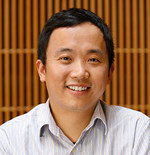
Tang
Washington University in St. Louis will receive funding through Grand Challenges Explorations, an initiative created by the Bill & Melinda Gates Foundation that enables researchers worldwide to test unorthodox ideas that address persistent health and development challenges.
Yinjie Tang, PhD, the Francis Ahmann Career Development Assistant Professor in energy, environmental & chemical engineering in the School of Engineering & Applied Science, will pursue an innovative global health research project, titled “Using Fecal Sludge for Butanol Fermentation.”
Grand Challenges Explorations funds scientists and researchers worldwide to explore ideas that can break the mold in how we solve persistent global health and development challenges. Tang’s project is one of 110 Grand Challenges Explorations grants announced Nov. 8.
“We believe in the power of innovation — that a single bold idea can pioneer solutions to our greatest health and development challenges,” says Chris Wilson, director of Global Health Discovery for the Bill & Melinda Gates Foundation. “Grand Challenges Explorations seeks to identify and fund these new ideas wherever they come from, allowing scientists, innovators and entrepreneurs to pursue the kinds of creative ideas and novel approaches that could help to accelerate the end of polio, cure HIV infection or improve sanitation.”
Projects that are receiving funding show promise in tackling priority global health issues where solutions do not yet exist. This includes finding effective methods to eliminate or control infectious diseases such as polio and HIV as well as discovering new sanitation technologies.
To learn more about Grand Challenges Explorations, visit grandchallenges.org.
Tang proposes to develop a genetically engineered fungal species that can convert fecal sludge to butanol, a high-energy biofuel similar to gasoline. The fungal species could not only produce biofuels, but also kill pathogenic microorganisms in fecal sludge.
“Many fungi have robust metabolisms,” Tang says, “so there’s a good chance that some will be able to live off of different organic compounds in the sludge, producing molecules that can be used as fuels as a waste or byproduct.”
“Fungi also secrete alcohols and antibiotics that would inhibit the growth of harmful bacteria or organisms, always a concern when fecal material is recycled,” he adds.
“The Gates grant application process is very simple,” Tang says. “You just need to present your innovative idea.“But turning the idea into a reality will be very challenging, since we need to engineer a genetically stable and robust species that can out-compete native microbes in the sludge. That’s not so simple.”
He’ll know soon whether it will work. “We’ll be testing our idea during phase 1 of the grant, which will complete in the next 18 months,” Tang says.
About Grand Challenges Explorations
Grand Challenges Explorations is a $100 million initiative funded by the Bill & Melinda Gates Foundation. Launched in 2008, Grand Challenge Explorations grants have already been awarded to nearly 500 researchers from over 40 countries. The grant program is open to anyone from any discipline and from any organization. The initiative uses an agile, accelerated grant-making process with short, two-page online applications and no preliminary data required. Initial grants of $100,000 are awarded two times a year. Successful projects have an opportunity to receive a follow-on grant of up to $1 million.